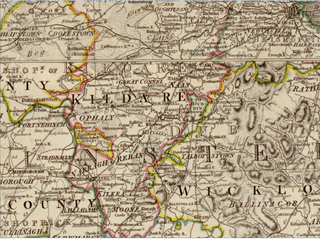Henry FitzHugh may refer to:
Fitzhugh is an English Anglo-Norman surname originating in Northamptonshire and Bedfordshire. It is patronymic as the prefix Fitz- derives from the Latin filius, meaning "son of". Its variants include FitzHugh, Fitz-Hugh, Fitz Hugh, fitz Hugh, and its associated given name turned surname Hugh. Fitzhugh is rare as a given name.

William Fitzhugh was an American planter, legislator and patriot during the American Revolutionary War who served as a delegate to the Continental Congress for Virginia in 1779, as well as many terms in the House of Burgesses and both houses of the Virginia General Assembly following the Commonwealth's formation. His Stafford County home, Chatham Manor, is on the National Register for Historic Places and serves as the National Park Service Headquarters for the Fredericksburg and Spotsylvania National Military Park.

William Henry Fitzhugh Lee, known as Rooney Lee or W. H. F. Lee, was the second son of General Robert E. Lee and Mary Anna Custis. He was a planter, a Confederate cavalry General in the American Civil War, and later a Democratic Congressman from Virginia.

Colonel Robert Carter I was a planter, merchant, and government official and administrator who served as Acting Governor of Virginia, Speaker of the Virginia House of Burgesses, and President of the Virginia Governor’s Council. An agent for the Northern Neck Proprietary, Carter emerged as the wealthiest Virginia colonist and received the sobriquet “King” from his contemporaries connoting his autocratic approach and political influence.
Edward Barradall was a British attorney, admiralty judge and politician who represented the College of William and Mary in the House of Burgesses, served as mayor of Williamsburg and compiled the first volume of decisions of the general Court of the Colony of Virginia.

Baron FitzHugh, of Ravensworth in North Yorkshire, is an abeyant title in the Peerage of England. It was created in 1321 for Sir Henry FitzHugh. The title passed through the male line until the death in 1513 of George FitzHugh, 7th Baron FitzHugh, when it became abeyant between his great-aunts Alice, Lady Fiennes and Elizabeth, Lady Parr, and to their descendants living today, listed below. The family seat was Ravensworth Castle in North Yorkshire, situated 4.5 miles north-west of Richmond Castle, caput of the Honour of Richmond, one of the most important fiefdoms in Norman England.
Fitzhugh is a given name and surname.
Fitz was a patronymic indicator used in Anglo-Norman England to help distinguish individuals by identifying their immediate predecessors. Meaning "son of", it would precede the father's forename, or less commonly a title held by the father. In rare cases, it formed part of a matronymic to associate the bearer with a more prominent mother. Convention among modern historians is to represent the word as fitz, but in the original Norman French documentation, it appears as fiz, filz, or similar forms, deriving from the Old French noun filz, fiz, meaning "son of", and ultimately from Latin filius (son). Its use during the period of English surname adoption led to its incorporation into patronymic surnames, and at later periods this form was adopted by English kings for the surnames given some of their recognized illegitimate children, and by Irish families when anglicizing their Gaelic patronymic surnames.
Elizabeth FitzHugh also known as Lady Elizabeth Parr. She was an English noblewoman and lady-in-waiting to her cousin, Anne Neville, queen consort of King Richard III. She was grandmother of Catherine Parr, sixth queen consort to King Henry VIII, and her siblings Anne Herbert, Countess of Pembroke, and William Parr, 1st Marquess of Northampton.

William Randolph II, also known as William Randolph Jr. or Councillor Randolph, was an American planter and politician. He was the Treasurer of Virginia and the oldest child of William Randolph and Mary Isham.
Hon. George FitzHugh was Chancellor of Cambridge University and Dean of Lincoln.

The High Sheriff of Kildare was the British Crown's judicial representative in County Kildare, Ireland from the 16th century until 1922, when the office was abolished in the new Free State and replaced by the office of Kildare County Sheriff. The High Sheriff had judicial, electoral, ceremonial and administrative functions and executed High Court Writs. In 1908, an Order in Council made the Lord Lieutenant the Sovereign's prime representative in a county and reduced the High Sheriff's precedence. However, the sheriff retained his responsibilities for the preservation of law and order in the county. The usual procedure for appointing the sheriff from 1660 onwards was that three persons were nominated at the beginning of each year from the county and the Lord Lieutenant then appointed his choice as High Sheriff for the remainder of the year. Often the other nominees were appointed as under-sheriffs. Sometimes a sheriff did not serve his full term due to death or another event, and another sheriff was then appointed for the remainder of the year. The dates given in this article are the dates of appointment.

Henry FitzHugh, 3rd Baron FitzHugh KG of Ravensworth Castle in North Yorkshire, was an administrator and diplomat who served under Kings Henry IV and Henry V.
Fitz is a male given name and nickname which may refer to:

The feudal barony of Okehampton was a very large feudal barony, the largest mediaeval fiefdom in the county of Devon, England, whose caput was Okehampton Castle and manor. It was one of eight feudal baronies in Devonshire which existed during the mediaeval era.
Fitzhugh Lee (1835–1905) was the 40th Governor of Virginia and United States Army general. Fitzhugh Lee or Fitz Lee may also refer to
Henry Fitzhugh was an American planter who served a term in the House of Burgesses and whose portrait was painted by John Heselius.
Henry Fitzhugh was an American planter and soldier who served two terms in the House of Burgesses representing then-vast Stafford County and was an unsuccessful candidate for Speaker.

John FitzHugh was an Anglo-Norman royal counsellor to King John of England.
William Fitzhugh (1741–1809) was an American planter, legislator, and patriot.